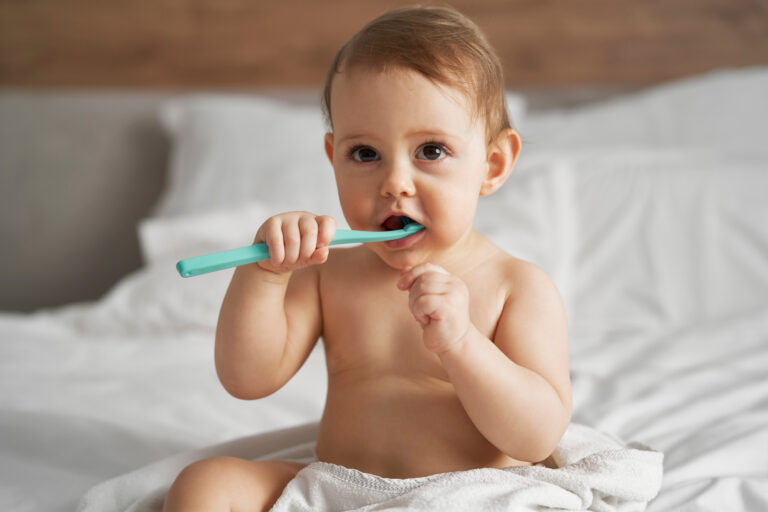As a parent, there’s nothing more endearing than the sight of your little one’s first tooth poking through. While it’s a milestone worthy of capturing, it’s also a reminder that it’s time to think about their dental health. Dental hygiene starts from a young age, and for parents in Lowell, AR, knowing the right tools and techniques can be crucial. One such essential tool? The infant toothbrush.
Why Start Early with an Infant Toothbrush?
The importance of oral care cannot be overstated, even when it’s just a single tooth that has sprouted. Infants are susceptible to cavities, too. Yes, even if they have one tooth! The tiny grooves and spaces can easily harbor bacteria. An infant toothbrush is designed to gently clean the infant’s teeth and gums, ensuring that no harmful bacteria linger around.
Tips for Infant and Toddler Dental Health:
1. Introduce the Infant Toothbrush Early: Even before your baby’s first tooth comes in, you can start familiarizing them with the infant toothbrush. Initially, use a soft, wet cloth to wipe the gums after feeding. As soon as the first tooth pops in, transition to a soft-bristled infant toothbrush.
2. Gentle Brushing: When using the infant toothbrush, use gentle, circular motions. You want to ensure that you’re cleaning without causing any harm or discomfort.
3. Use the Right Toothpaste: For infants, opt for a fluoride-free toothpaste. When they reach the age of two, and you’re sure they won’t swallow the paste, you can introduce a fluoride-containing one. Remember, only a smear is enough for infants, and a pea-sized amount is sufficient for toddlers.
4. Regular Dental Checkups: It’s recommended to schedule your baby’s first dental checkup when their first tooth appears or no later than their first birthday. Regular checkups can help detect potential issues early on.
5. Limit Sugary Foods and Drinks: Sugary substances are the main culprits behind cavities. If your infant is on a bottle, avoid sending them to bed with it. Milk can pool in the mouth, leading to cavities. When they transition to solid foods, be mindful of the sugar content.
6. Promote Drinking Water: Water not only helps in hydration but also aids in washing away any lingering sugars and acids that can harm baby teeth.
7. Beware of Bottle Decay: As mentioned, going to bed with a bottle can be harmful. It’s essential to ensure that the baby’s teeth are clean before bedtime.
Making Brushing Fun:
Introducing your child to an infant toothbrush can be a fun activity. Here are some tips:
Let them choose: Toddlers love having a say. When they’re old enough, let them pick their toothbrush. The more they love it, the more likely they are to use it.
Brush Together: Children love mimicking adults. By brushing together, you can turn it into a bonding activity, all while teaching them the correct way to brush.
Use Fun Toothpaste: Today, there are numerous child-friendly toothpaste flavors. Letting your child pick a flavor can make the process enjoyable.
Time It with a Song: A two-minute song can ensure they brush for the right amount of time and make it enjoyable.
**Disclaimer:** Always talk to a dentist or doctor before acting on any advice in regard to your child’s health. What works for one child may not necessarily be suitable for another.
The infant toothbrush plays a pivotal role in setting the foundation for good oral hygiene. By introducing it early and maintaining regular dental checkups, you are setting your child up for a lifetime of healthy smiles. At Sprout Pediatric Dentistry in Lowell, AR, we are always here to guide and help you in ensuring the best dental health for your little ones.


